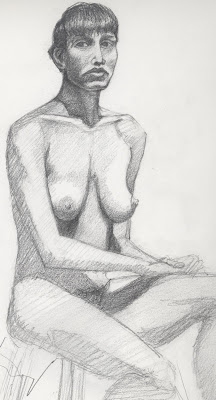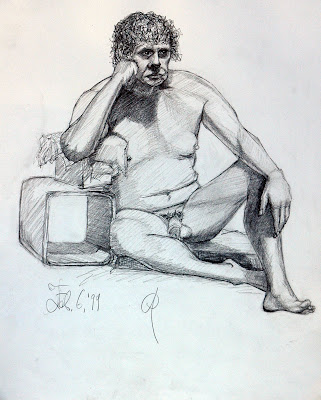For years I was an avid hunter and fisherman. I wanted to hold the things I loved, birds and beasts and bright colored fish. In the same way I have long been driven to collect, trinkets and treasures, photographs, letters, books, and memories. Once, on my mission another elder asked what I was collecting while in Japan. A member interjected, “Kana Choro collects people.” A treasured complement; I collected it. Then came the family, wife, five children, and then the grandsons; what a piece of work.
Creating art seems a more transcendent goal than killing ducks, if not as worth as making friends or have children. The force that drives all this joy seems rooted in the most primal of passions.
To me, drawing a human figure is at once the most desired and the most intimidating face of art. Everyone knows what a person looks like, even though they don’t all know why; thus we see every flaw. It is particularly intimidating to draw a picture that is to look like someone, especially a someone you care about; a friend or family member.
Any of my efforts at figurative work before 1990 were both fractured and poor, an occasional hand, eye, or ear. I did try a few heads for my Art Classes at BYU and USU, but they are so grotesque, that even in this retrospective, I cannot bring myself to reference them. I entered the 1990’s determined, to produce acceptable representations of the human form. This quest has driven my artistic study ever since. I have produced books full of non-figurative sketches, but even they are only supportive of my ultimate goal. There is no experience in art as powerful as creating a beautiful figure and being able to look at it and say, now you are real: before I created you, there was only dust.
1991
This drawing is a good starting point. As my great master, Robert Beverly Hale, would point out – I was drawing what I saw – eyes and ears and nose and hair – but I knew nothing about them, grasped no relationship between them. I didn't know the forms which represent them in the illusion of three-dimensional space, or what was beneath the surface, the actual froms that produced the face. When I drew them, they were unconnected. Yet at the time I took hope.

Since I was only drawing bits and pieces, limiting my drawings to bits was more successful.

1992
I was reading books; looking at pictures, and asking questions. I asked Mr. Egan, our high school Art teacher, how to draw a nose. He showed a simple stylization. I would us it over and over again. I discovered that there were ideal proportions and positions of the features on the face. I’m afraid even with the book in front of me I had trouble getting them right.

1993
I tried this one of my son Lafe, from a photograph. I didn’t know how to make the pencil marks. I could see the value changes but had no idea what made them, that which needed to be recorded by my tools and those which needed to be rejected by my mind. One must learn to draw with the mind.

Lafe
1994
Since realism wasn’t working for me I decided to simplify – to turn to the “cartoon”. Through the spring of 94, I drew dozens of these faces and figures. Some a bit shocking – but I was pleased with many. Below I have chosen a representative few.


.
.
.
I returned from camp that fall determined to master drawing. I had read more books – and determined to make a series of drawing of some of the guys who had worked for me over the years. I forced myself to draw every day. I learned a lot – mostly I learned that I didn’t know what I was doing.
.
Jody Orme
Chris Carter
Eric Mcpherson
So many wonderful models, again I was learning, mostly that I didn’t know what I was doing. Looking at the odd creations I wonder that they ever pleased me, but they did. I decided that I needed to take Art Lessons.
1995
I was no longer the Debate Coach at the high school. Suddenly, I had time to get instruction. I was lucky enough to find a great teacher, Rob McKay. A successful illustrator, he was an exception to most of the “Fine Art” teachers at the U. I have had class from several of them. They didn’t have much to teach, caught up in relitivism they didn't see much use in rule, but rules are what I needed most. Rob, on the other-hand, was willing and able to share what I needed to know. I learned that I had a long way to go. Below are some of the exercises he had me do.
One must master the basic shapes, one must know the forms of the forms.
And one must understand what it is, that just below the surface, creates what we see.
Instruction does make a difference. A teacher, and the truth he can teach are key to progress. By the end of that year I was producing much more satisfactory work. But I was still just learning.
I now knew of such things as line and value. Not really how to use them, I was not their master, but I could see them.
1996
I still could not do what I wanted to do, what I thought “real artists” do. Draw anything from life. I did try – not with much success – but then I had also learned that success was going to be a long time in coming. I made models of my children. They are so beautiful.
My son Bryon
I was not the debate coach, but I was the assistant director of the school play. It was Ron Peterson’s last year. Together we did A Man for All Seasons. My son Bryon had a part, as did one of my favorite students, J. R. Hankins. I had also taken a watercolor class. I tried combining my learning. These are from Photographs. I still own the one of Bryon – I gave the original of J. R. to Mr. P.
(detail)
After the play, I tried this drawing of Curtis Weller. It is from a picture I took at Yellowstone Lake. I hope he will forgive me. Still so far to go.
(detail)
1997
I came back from Camp that fall determined to do better. I found a book on drawing portraits from photos, I pored over it and did all the drills.


Then I tried some drawings from photos. First Socrates, then Deng Xiaoping, finally Jody Orme.
I tried to remembre what is inside.
1998
Photographs are OK but I still longed to draw from life. Rob told me about the life drawing classes every Saturday at the U of U. I started attending every Saturday. Week after week I spent several hours trying to capture the illusion of the human form. I was quite pleased at the time, now looking back at my efforts of the time – well let’s just say, I only found one I cared to share. I learned a lot – but then a miracle occurred. Posted on the bulletin board by the elevator was an advertisement for art lessons by Kamille Corry.
.
.
I called and asked for a chance to learn. After reviewing my portfolio she accepted me as a student. Thus began a two years of wonderful instruction. I found a teacher who knew the truth, and was willing to share it. Only my own weakness would hold me back. It was so wonderful to have an honest critic. Someone who taught techniques and truth, who told me straight out what was right and pointed out when I was wrong.
She shared with me the secrets of “Classical Academic Training”. We began by copying Charles Bargue lithographs.
.
.
As I studied with Kamille, I continued to go to the University’s Figure Drawing sessions each Saturday.
(detail)
(detail)
(detail)
1999
Then we moved on to cast drawings. First a hand, then a head; drawn on fine Italian paper with vine charcoal. These are full sized sight/size drawing. Kamille carefully trained and truthfully critiqued. She taught me how to hold the charcoal, how to erase, how to keep my lines parallel; how to measure and keep scale and position, and always to be thinking about the why of everything. It was like magic.
I continued drawubg at the U each Saturday. These are only a few of the drawings I did.
(detail)
.
(detail)

After "cast drawing" came copying from the masters.
Then the decade was over – the new millennium arrived. I had come a way, I had learned some truth.














































2 comments:
My dear friend and teacher, I can't express my pleasure that you would choose me as one of your subjects. I can't belive that this drawing had existed for so long and I've never known about it. My children will love it. I'm following your blog now so I won't be in the dark any longer. God bless you my friend. Curtis.Weller@Gmail.com.
What ever happened to J R Hankins? He was one of my favorite students also.
Post a Comment